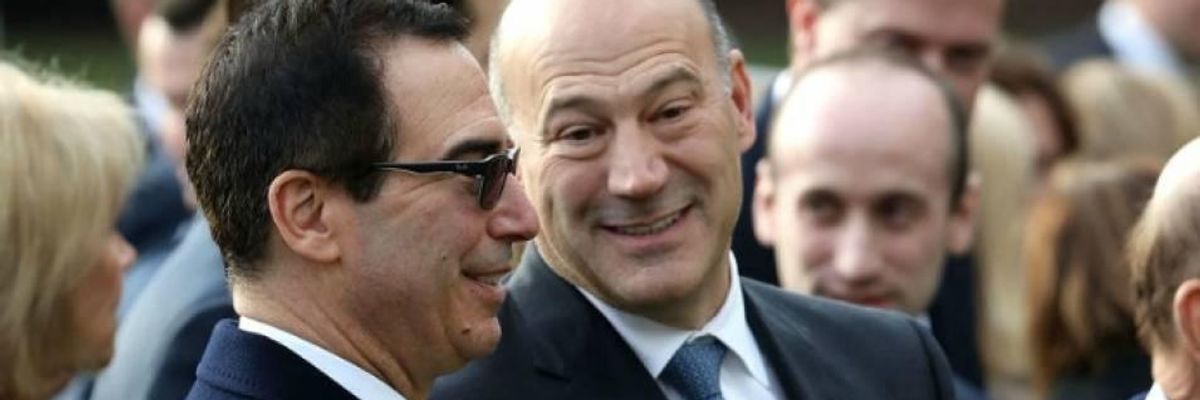Just over two months after the Trump administration celebrated its most notable policy achievement of President Donald Trump's term--passage of massive tax cuts for corporations and the wealthy--the President's chief economic advisor Gary Cohn, former head of Wall Street giant Goldman Sachs, announced his resignation on Tuesday.
Reportedly over an intractable dispute over a plan by Trump to impose new tariffs on steel and aluminum imports, a policy the top aide had opposed and lobbied against, Cohn's departure is both the latest exit of a senior White House official and a development met in progressive circles with a collective, "Don't let the revolving-door hit you on the way out."
"It has been an honor to serve my country and enact pro-growth economic policies to benefit the American people, in particular the passage of historic tax reform," said Cohn in a statement. He didn't mention that by 2027, when the tax cuts are full implemented, how a Tax Policy Center analysis showed that 83% of the benefits of those tax cuts will go to the top 1% wealthiest of taxpayers.
Many noted that since the passage of the tax cuts in December, Cohn likely had little incentive to stay in the White House:
Other widely-shared sentiments on Twitter included:
"It is very telling that for Cohn, a registered Democrat, the final straw in leaving was not Trump's horrifying response to the Charlottesville white supremacist uber-hate fest or endless attacks on Mexicans and Muslims, but a steel trade enforcement action involving tariffs that would be 5 percent lower than the steel trade action enacted by President George W. Bush in 2002," said Lori Wallach, director of Public Citizen's Global Trade Watch.
"That Cohn is a Democrat," she continued, "did not stop him from joining the Trump administration, but that his departure would be spurred over a trade policy dispute reveals that his years on Wall Street at Goldman Sachs apparently made his one unbending principle the defense of the corporate-managed trade policies that have outsourced millions of middle class jobs and pushed down Americans wages."
As journalists Gary Rivlin and Michael Hudson detailed for The Intercept and The Nation's Investigative Fund last fall, Cohn provided his former colleagues at Goldman, and his friends on Wall Street more broadly, "everything [they] ever wanted from the Trump administration" during his time in Trump's inner circle.
While some considered Cohn at first an unlikely choice to guide the president, Rivlin and Hudson explained how the Trump economic agenda, it turned out--from privatization schemes to massive deregulation to endless corporate giveaways and tax cuts--was "largely the Goldman agenda, one with the potential to deliver any number of gifts to the firm that made Cohn colossally rich."

